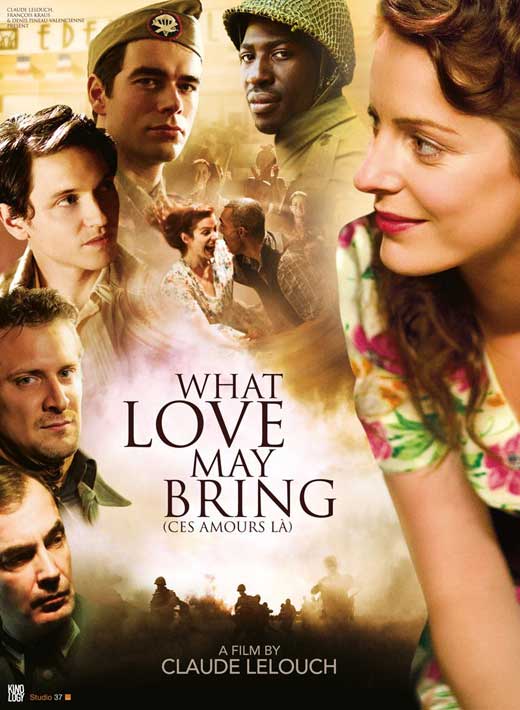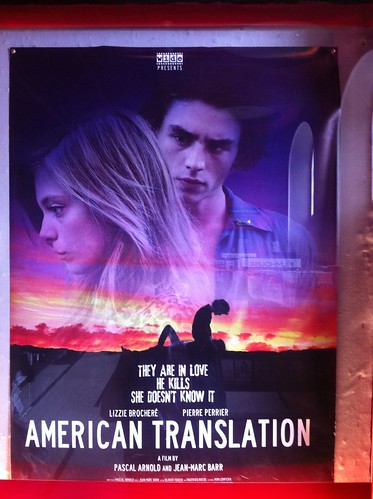
My first trip to The Chicago Film Festival last weekend aroused my primal excitement for film...I re-discovered the pure love for the motion picture that I first felt in my adolescence.
The AMC River East 21, right in the heart of Chicago's Gold Coast and the Magnificent Mile, provided a perfect home and showcase for the entire Film Festival, under one roof. If I had the time and resources, I could have reveled in as many as five films.
I did manage to attend two screenings, in between meeting staff and volunteers, walking in unseasonably warm sunshine all the way to Navy Pier, snapping photos of the light on the lakefront, and cooling off in the peaceful formality of a small art gallery.
And now, mini-reviews of the two screenings I attended, both from France: "American Translation", and "What Love May Bring."
* * * * * * *
"American Translation", filmed in Paris and the surrounding countryside by Pascal Arnold and Jean-Marc Barr, keeps a viewer off-balance. The script, by Arnold, takes an erotic story of young lovers and introduces dangerous material about murder and addiction and the pleasures of the sordid. It's a slice-of-life psychodrama that builds a good amount of tension in its first two thirds, before losing its focus in the final scenes, and coming to sudden conclusion that resolves none of the psychological issues it begins to explore.
Still, it works as a seething romance between Aurore, an aimless and privileged girl of French-American parents, and Chris, an illiterate, darkly attractive cad with a taste for strangling young male prostitutes. After they meet by chance in a hotel restroom and agree to stay together, Aurore becomes helplessly intrigued and enamored of this walking time bomb, who nevertheless opens up to her and reveals everything.
The film takes a blackly comic and disturbing turn as, instead of fleeing in fear from Chris, Aurore becomes fascinated, drawn in, and agrees to participate in Chris' criminal scenarios.
Lizzie Brochere as Aurore succeeds in the tricky task of convincing the viewer of her outright addiction to this handsome criminal. As Chris, Pierre Perrier is charming and frightening, in a performance as sensual as anything I have seen on screen in years. There is real chemistry between the two, a natural rawness They exude a tragic beauty; I don't think the actors even wore makeup.
The movie subverts an American romantic notions about European country idylls, using jump cuts and techno-pop in otherwise tranquil road scenes as the two lovers travel in their van looking for new victims. There are long stretches of anticipatory dread with nothing but ambient city noise heard outside a window, or natural sounds during a victim's final moments. Sometimes, Chris and Aurore appear as innocents with no control over their dark impulses. There is an unexplainable connection between them; they even prevail on a priest in Chris' home town to "marry" them, after which they have wedding bands tattooed on their ring-fingers.
One thing that attracted American audiences in the 1950's and '60's to European cinema was the frank and matter-of-fact treatment of sexuality and the human body. It appears that this free attitude toward sexuality still holds. There is enough nudity in "American Translation" to scandalize a mainstream American audience. Considering the violent natures and activities of the characters, depictions of violence are kept to a minimum, and what is shown is not explicit. There is something perversely refreshing about a film about young serial killers that prefers female breasts and male genitalia to blood and gore. There is virtually none of the latter in this film.
For lovers of vintage art-house cinema, "American Translation" can be described as an oddly winning blend of Terrence Malick's "Badlands" and Bertolucci's "Last Tango in Paris", with the menacing undercurrent of "Henry, Portrait of a Serial Killer." If you like edgy filmmaking, how can you go wrong?
* * * * * * *

"What Love May Bring" demonstrates the possibility of crafting a deeply personal film on a grand, epic scale. Veteran Director Claude Lelouch (Oscar-winner for "A Man and a Woman", 1966) has given us his 47th film, a love poem to the cinema, and a tapestry of five stories told in a single narrative, all of them true.
Lelouch tells these stories in the style of the movies he loved as a child. So, his WWII tales of Nazi intrigue, ill-fated romance, resistance, cabaret singers, nightclub dancers, treacherous lovers, and a little Jewish boy in hiding, take on the style of melodrama, musical comedy, battle epic, and silent film. The movies, and their partner, music, are the substance of "What Love May Bring".
It is a lovely film, a feast of sorts. While it can be seen as self-indulgent, I accepted it as Lelouch's expression of gratitude for the art and the industry that sustained him, and a "thank you" to those before his camera and behind it for almost 50 years.
The plot is convoluted and would take too much time to recount it all here. Much of it is fanciful and gruesome in equal measure, running the gamut from musical fantasy to wartime realism. It attempts to contain the sweep of history, beginning with a WWI newsreel filmmaker, his widow, and his orphaned son. The son grows up to survive the death camps, becomes a musician, and then a lawyer.
The stories are told in flashback as the lawyer defends in court the central character, a young woman who is charged with murdering her husband, who in turn may have shot his army buddy over her. She hides a Jewish friend's son in her father's cinema every day. The backstories involve the woman's affair with a Nazi Officer to save her father, a projectionist, from the firing squad, and the origin of her husband's fortune, won by his grandfather (a Native American) in a land-race. The film wants to embrace all of this history, stylized to the movies that filtered the world for the character who emerges as the rightful narrator.
To keep up with the plotlines and characters is exhilarating and a bit exhausting, but finally rewarding, as it becomes clear that Lelouch is celebrating an art form that had saved his life and became a life's passion. By the time we are looking at a montage of shots, the faces from Lelouch's previous films, we come to realize that the Jewish boy hiding from Nazis every day in the movie theater is Lelouch himself. I was terribly moved by this realization, as the images and the music washed over me. The music, by the way, is by long-time collaborator Francis Lai ("Love Story").
Sure, it is sentimental. But I think Lelouch has a right to feel emotional, and to want to enthusiastically share his love of the cinema with all of us, as well as his family, who all carry the mantle of the performing arts.
Lelouch became friends with Chicago Film Festival founder Michael Kutza back during Kutza's college days when he discovered Lelouch's liberating style of filmmaking. The screening was followed by a wonderful Q & A with Lelouch afterward. Those of us who attended felt the electricity of a magical film experience, presided over by its creator.
Note: IMDB lists this film under the title "What War may Bring". That certainly lends the whole film a different kind of gravity. Not sure when, or why, the title changed.


No comments:
Post a Comment